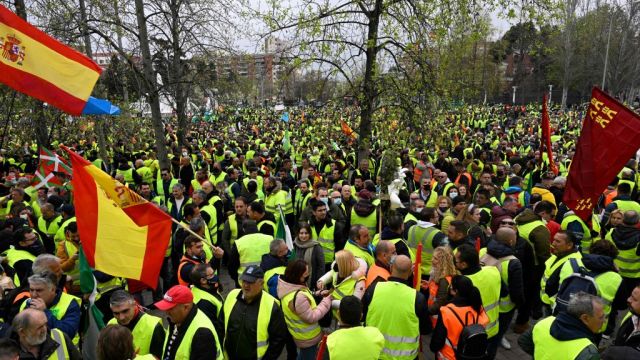Spain's transport minister agreed to meet with striking truck drivers on Friday after they rejected a €1 billion support package aimed at defusing a 12-day walkout over fuel prices that has caused sporadic goods shortages.
Minister Raquel Sanchez announced the measures, which include a rebate of €0.20 per litre of fuel and a €1,200 bonus, after all-night talks with transport associations.
But within hours, the unofficial truckers' group that launched the strike on March 14th, and which was excluded from talks with government, rejected the proposal and began blocking Madrid's central La Castellana avenue.
"We're going to ask her that we be able to work at a dignified price... We want guarantees to be able to cover our production costs," protest leader Manuel Hernandez told reporters from the centre of the Madrid march.
Many of the protesters wore high-visibility jackets reminiscent of France's gilets jaunes protests. Demonstrators also blocked Barcelona's coastal ringroad and burned tires at a border crossing with Portugal.
Far-right
Shortly after the protests began minister Sanchez agreed to meet the strike leaders, who she had initially dismissed as unrepresentative and linked to the far-right.
"I have never had any problem meeting with them, but what we must celebrate today is this agreement...and that is what I am going to try to explain to them this afternoon," she told state broadcaster TVE.
Ms Sanchez said all the truckers' demands were included in the deal, so there was no reason to maintain the strike.
Fuel prices
"This seems like a temporary patch to us that doesn't fix the problem at all," said protestor Juan Jose Moral, as the angry crowd marched towards the transport ministry.
The rebate on fuel prices, a quarter of which will be paid by oil companies, will also apply to other transport companies, she added. Bus, light truck, ambulance and taxi drivers will also receive - albeit smaller - bonuses.
As part of the package, the government will approve a new line of state-backed credit lines with a 12 month-freeze on loan repayments, or so-called grace periods where companies are just required to pay interest and not the principal on a loan.
The government has not disclosed the amount of the new liquidity loans to support mid-sized companies and households in the context of Russia's invasion of Ukraine.







